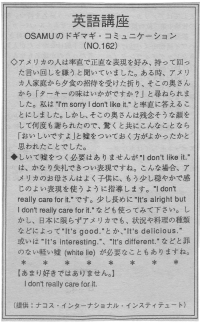あまり好きではありません。
Joshua's Case
One time I went to my friend Mike's house for dinner. Mike's family was Italian and they usually cooked traditional Italian dishes. For dinner that night, they cooked a pasta dish with mushrooms. It was unfortunate for me because I really didn't like mushrooms. At that point, I was caught in a weird situation because on one hand, I didn't want to eat the food but on the other, I didn't want to be rude and not eat the dish. I basically decided in the end to just be polite and eat the dish. I could have said something like “It looks delicious but I don't really care for mushrooms,”but I decided to just try and eat it. It was hard trying to eat it all but somehow I did. After I finished, it was funny because Mike's family asked me how I liked it and I said “Oh it was really good”, even though I didn't like it. And then they said “Really, you liked it...have another plate.”So then they gave me another plate and I had to eat it all over again. Sometimes I think its better to be honest than polite.
This was an unusual case because Mike is my best friend and I would do a lot for him. But usually, if I was at anybody else's house and don't want to eat something, I would say, “This looks really good but I'm sorry, I really don't care for ____ .”I think this is would be the most polite way of not accepting somebody else's food. It doesn't offend the other person because you are basically saying that it's your fault for not liking the food, not theirs.
In Japanese, I've heard you can say in this situation, “Sumimasen. Gomennasai, kore nigate desu.”(すみません。ごめんなさい、これにがてです。)This is a polite way of saying “I don't really care for” something. The underlying meaning of this phrase is that “It is my weakness for not accepting what you are trying to give me” and that “I am humbly apologizing for not accepting your food.”In general, Nigate has many meanings in different situations. It can be used to say that you are too weak/or unable to do something. For example,if I like to play golf but I am not good at it,I would humbly say “nigate desu.”In another situation, it can also mean that you don't like something and want to avoid it. For example, if you are about to get married and are worried about talking to your fiance's parents, you would say “nigate desu.”
It looks delicious but I don't really care for_____ .
あまり好きではありません。
Osamu's case
I don't care for it. Osamu didn't know how to say he didn't like something. He could only say it directly. So he learned how to say he didn't like something. You could also tell a little white lie and say something is interesting or different.
アメリカの人は率直で正直な表現を好み、持って回った言い回しを嫌うと聞いていました。ある時、アメリカ人家庭から夕食の招待を受けた折り、そこの奥さんから、「ターキーの味はいかがですか?」と尋ねられました。私は、I'm sorry I don't like it. と率直に答えることにしました。しかし、そこの奥さんは残念そうな顏をして何度も謝られたので、驚くと共に、こんなことなら、「おいしいですよ」と嘘をついておけば良かったと思われたことでした。
しいて嘘をつく必要はありませんが、I'm sorry I don't like it. は、かなり失礼できつい表現ですね。こんな場合、アメリカのお母さんは子供に、もう少し穏やかで感じの良い表現を使うように指導します。I don't care for it. です。It's alright but I don't really care for it. なども使ってみて下さい。
しかし、日本に限らずアメリカでも状況によって、It's delicious. とか、It's good. 、あるいは、It's interesting. とか、It's different. などと、罪のない嘘/white lie/が必要な時もありますね。
あまり好きではありません。
I don't really care for it.


